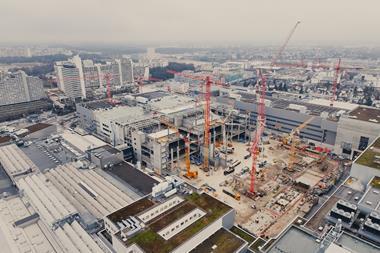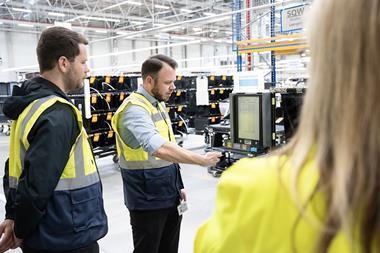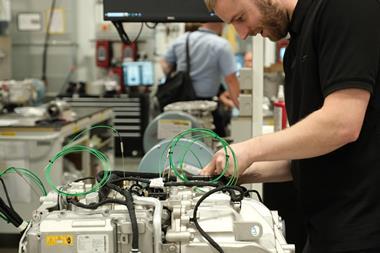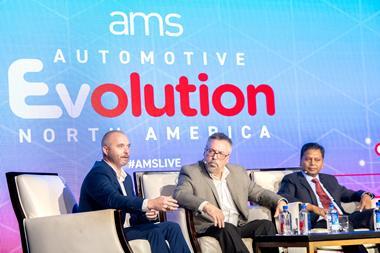Training methods must continue to evolve if workforce skills are to keep pace with technological change
As developments in the automotive industry continue to move at a rapid pace, it is vital that manufacturers recognise the importance of highly skilled workers; ensuring that employees develop their skills can have a massive impact on a company’s bottom line. While training has always been key, companies are not only increasing the volume of available opportunities, but also evolving the way they deliver their programmes to meet the changing needs of the industry, from both a technological and process standpoint. This includes rejuvenated apprenticeship schemes, training for new product launches, online courses and programmes that aim to improve the skills of the current workforce.
Bentley Motors’ Upskilling programme, which started in early 2014, is a prime example. The company is investing in new training tools and facilities to grow its current workforce, recruiting people to focus on core competencies within the business (Wood, Body, Trim and Engine). It has also redesigned its apprenticeship training scheme. “We are using a number of tools to ensure a strong skill base continues throughout the business,” says Lynne Williams, head of people development and talent management at Bentley Motors.
Specially designed training islands in the Bentley production facility will provide ‘near the job’ training, moving workers away from the standard ‘on the job’ process, with training undertaken by mentors who are experts in their field. The premium maker has also appointed a number of master trainers to develop and deliver a training curriculum to its latest apprenticeship intake – the largest in a decade. “This is key to the often-faced challenge in the industry of keeping skills and competencies within the business and passing them on through generations,” says Williams. The apprentices have joined a dedicated, manufacturing-focused scheme at the recently opened Bentley Training Facility at a partner college in the UK.
While Williams believes that Bentley is already seeing tangible improvements, the Upskilling programme is an evolving project that will change over time to maximise the benefits for the workforce and meet the OEM’s business needs. “We’ve been delighted with the start we have made, but the future looks even stronger,” states Williams. “Not only will we continue with this programme so it reaches every one of our colleagues, but we are playing a crucial role in bringing a University Technical College to Crewe in the UK in 2016. This will offer an exciting and inspiring education for young people seeking a pathway to employment in engineering, technology or design.”

“Of course, the added benefit of this is for the learner – they fully understand why they are attending training, and being jointly supported by the manager and the development team means they can maximise their learning in and out of the training room.”
The OEM is currently working on the next generation of Bentleys and expects all its employees to share the same commitment to performance, quality and engineering excellence that its cars possess. The company’s approach to upskilling reflects the importance of ongoing learning for employees across the industry. “In an increasingly competitive industry, we are constantly looking to new technologies and innovations,” explains Williams. “This often means the need for bespoke training, working with our own experts and partner providers for flexible solutions. Providing colleagues with the skills to adapt to change and acquire new knowledge and competencies is key.
“We also recognise that sharing knowledge and expertise within our organisation is an important part of our development – identifying our expert knowledge, developing and sharing this across technologies is an approach we are taking.”
Spreading knowledge worldwide
Sharing training knowledge across the organisation is also important for high-volume manufacturers with plants spread across the world. This is especially true when it comes to delivering specific training related to the development of new models or parts. In May 2014, General Motors (GM) began training for the new Electric Drive Unit being installed at the Warren Transmission Operations plant in Michigan. To date, team members in the production area have received 1,544 hours of training, electricians have received 1,235 hours, mechanical specialists 1,628 hours and the engineering group 1,597 hours.
"Knowledge empowers the employee to understand and better make decisions"
– Joyce May, GM
The biggest challenge GM faced was timing the training to avoid interfering with the installation, scheduling of run-offs and machine validations. “Timing is everything,” says Joyce May, launch training coordinator at the Warren plant. At GM’s Tonawanda Engine Plant in Buffalo, New York, training supervisor Zennette Baker agrees: “Our biggest challenge during launch training is timing. You want to be sure the students retain the knowledge to be able to work on the equipment when it is installed and functional. If you train too early, you risk the student not remembering what he or she learned. Yet, there are so many classes that need to be scheduled that you want to complete before the start of production.” Baker says that some students elected to take a class twice and that suppliers were contacted to provide troubleshooting tips.
When GM launched a new engine programme at Tonawanda (for the 2.5-litre/2.0-litre Turbo and 6.2-litre LT1 Corvette, and 4.3-litre V6, 5.3-litre V8 and 6.2-litre V8 EcoTec3 engines), the electricians received the bulk of the training. “This was because the new equipment contained Siemens architecture that was very different from the current equipment that we were working with,” explains Baker.
“Furthermore, Fanuc robots were new to our facility and required training in programming, mastering and recovering functions.” The electricians, along with several controls engineers, were required to take the classes as a prerequisite for any other supplier and OEM training. The electricians and controls engineers, plus mechanical trades and operators, received more than 68,800 manhours of training.
Planning ahead with suppliers
One area of focus for GM as it seeks to continuously improve its training programmes is the design and delivery aspect. “Each supplier is contacted at least six months prior to equipment installation to put together a proposal for training,” says Baker. “Once the proposals are received, a conference call is scheduled to discuss details, which include the type of training; hours and costs for development and delivery; course materials and content; the amount of hands-on training time versus classroom; travel expenses, etc.” Changes are made as needed and, once all parties are in agreement, orders are submitted, dates are locked in and a training calendar is created. “Our latest launches included working with 72 different training suppliers,” states Baker.
The most recent launches at Tonawanda have equated to 610 classes completed over a 28-month period. “That is a far cry from the past launches where training was not as emphasised and lacked a dedicated team to pull it off,” says Baker. For GM, the benefits of this new approach to training are manifold. “We have employees that can operate, maintain, troubleshoot, recover, and repair machines and equipment,” explains Baker. “When downtime can equate to thousands of dollars lost in minutes, having a trained workforce is everything.”

May explains: “Educating the employees gives them the ability to effectively run their operations at the best possible level. This helps make the teams more productive, helping reduce downtime and scrap. Knowledge empowers the employee to understand and better make decisions.”
However, with the machinery used in manufacturing plants continuing to evolve rapidly, training will need to keep developing in line with these changes. “Suppliers are already developing web-based training that can be shared by several different plants that have the same machinery installed,” notes May. “This also helps lower the cost of training as development charges are now shared.”
Web-based training provides video examples of the machine area in question and enables employees to log on and access reviews when necessary. “Controls and computer technology are everywhere now on the manufacturing floor; updated training in all of these areas is a necessity to keep up with these changes,” states May. “With new products, new machinery and new technology, educating the employees has become more important than ever.”
Developing Premier personnel
This is a belief shared by Premier Group, a UK-based global manufacturer of low-volume, bespoke production panels primarily for the automotive industry. The company’s ethos is that the training and development of its staff is crucial to the continued growth and long-term progress of the business. Premier has invested £3m over the past four years in staff equipment and facilities. “The Group has grown rapidly, underpinned by our belief in retaining and developing the hands-on experience within the advanced engineering sector that all senior management possess, as well as enhancing these skills with 21st-century technology,” says Wayne Woolford, managing director at Premier.

Following an interview process, each successful apprentice is assigned a skill area, such as CAD, press, sheet metal or the tool room. During the four-year programme, the apprentices are supported by assessors from various local training providers in the UK, such as The Midland Group Training Services, Henley College, Coventry University, Warwick University and Coventry & Warwickshire Training. If the apprentices successfully complete the programme, there are opportunities to progress into further education, again supported and sponsored by Premier. Workers are also selected for accredited ‘train the trainer’ courses, so they can educate colleagues or run training sessions.
There is an established mentoring system. Woolford explains: “A press shop manager may well have 30 years of experience but not the recognised qualifications. This experience is priceless for less accomplished staff members to learn the skills first-hand.”
Woolford concludes: “A great deal of our time is committed to developing and training staff. We do still struggle to keep up with demand, though. Engineers, in the UK especially, have been undervalued for the past decade, and there is now a real skills shortage. It is predicted there will be a deficit of 200,000 engineers by 2015. But Premier Group is doing its bit to champion the artisan skills that are in danger of dying out.”


































